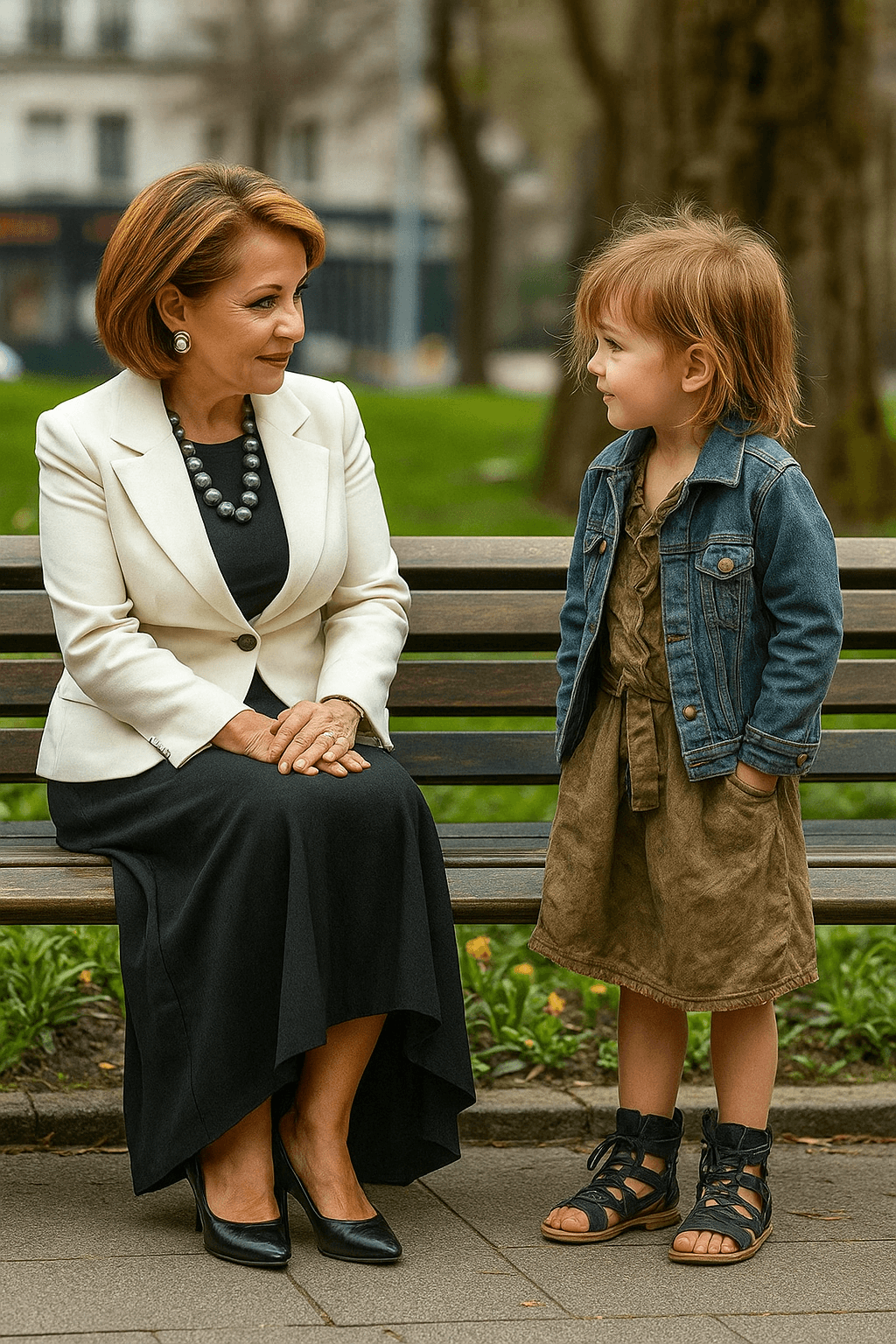When she arrived at the hospital to see her dying husband, a wealthy woman threw money at a homeless girl

— but after hearing a strange question, her entire life changed.
A refined woman, wrapped in an expensive coat, her gaze heavy and posture reserved, stepped into the aging city hospital. The air was thick with medicinal smells, and the walls seemed to echo stories of pain and loss. Her nose wrinkled slightly — not from the scent, but from memories suddenly rising to the surface.
Her husband, one of the country’s most famous billionaires, now lay in one of the wards. After his stroke, he had never spoken again. His eyes remained open but frozen, as if staring through time.
They had become strangers long ago. There was no divorce, but no love either. They lived like neighbors, separated by a wall of wealth, duties, and silence. When a lawyer called to say her husband’s condition was rapidly declining, she hesitated for hours. What could she say to him? What would he want to hear? Maybe he was waiting for one last signature to keep things in place. But when her car pulled up under the hospital’s portico, she realized: it wasn’t just about paperwork. It was about presence. About being there — even if it was too late.
At the entrance to the intensive care unit, she was met by a thin ten-year-old girl. The child held a plastic cup and stared at the hospital cafeteria. Her jacket was torn, her hair tangled, and her eyes held a strange calm — as if life had already taught her what truly matters.
The woman pursed her lips, pulled a few bills from her purse, and tossed them near the girl without slowing down.
— “Buy yourself something to eat,” she muttered through her teeth, as if trying to rid herself of a guilt she didn’t quite understand.
The girl looked up. She didn’t say thank you. She simply asked, softly, almost in a whisper:
“Did you ever tell him you loved him?”
The woman froze. The words struck her in the heart. She turned, but the girl was already walking away, her back bent like that of an old soul weary of life. For a moment, the woman felt she was vanishing into the air — but blamed it on her exhaustion.
The room was silent. Her husband lay motionless, his eyes fixed on the window. Maybe he had heard. Maybe he had seen. She approached carefully, as if afraid to disturb his final moments. She sat beside him. For the first time in years, she took his hand. Cold. But alive.
— “I… I’m sorry,” she whispered, her voice trembling. “I thought we had time. And then… I stopped believing.”
A tear slid down her cheek. She didn’t know if he heard. But suddenly, his fingers lightly closed around hers. As if to answer. As if to say goodbye. As if to say “Thank you for coming.”
A nurse passed by and glanced through the window.
— “Who was that?” she asked, surprised. “No one else was allowed in…”
But there was no one there.
The woman clenched her fist. Suddenly, she wanted to find that girl. Not to give her money — but to thank her. For the question that awakened something in her. For reminding her that there’s no time to waste. For appearing when it mattered most.
Two days later, her husband passed away.
At the funeral, the woman stood beside the casket wearing a black dress and expensive sunglasses. But she didn’t hide her face. The tears streamed freely, unashamed. Those who knew her barely recognized her: once cold, arrogant, always composed — now, she looked real. So real that some didn’t recognize her at first.
After the ceremony, she shocked everyone by giving up part of the inheritance and donating a large sum to charity. Soon, headlines read: “Billionaire’s widow funds shelters for homeless children.” Some called it PR. Others, grief. But she never commented.
In a brief interview, she said only:
“Sometimes, a single word from a stranger can change an entire life. What matters is hearing it in time.”
A month passed.
One evening, as the sun set, she returned to the hospital. She sat on the bench where the girl had once been. Where everything had begun.
And suddenly — she saw her.
The same coat. The same eyes. But now, she was on a memorial plaque at the hospital entrance:
“To the angels in white coats and the souls who left too soon.”
The woman stepped closer, her heart pounding.
— “Is that you?” she whispered.
The girl turned and nodded gently.
— “Thank you for listening.”
— “You’re not just a child, are you?”
There was no reply. The girl looked toward the sky — and simply vanished. No sound. No wind. As if she had never been there.
The woman stood still for a long time, hand over her heart.
For the first time in years, she felt peace.
Because she knew now — her husband hadn’t left with an empty heart.
And she hadn’t stayed with an empty soul.
Six months passed.
She radically changed her life: sold the seaside villa, stepped down from her corporate board seat, disappeared from social headlines. She was now seen only in a simple coat — reading fairytales to children in an orphanage, or cooking soup in a shelter kitchen.
But she never stopped thinking about the girl. Who was she? Why had she appeared? Why had she disappeared?
She searched. Visited every shelter. Asked every social worker. Showed pictures. No one had seen her.
Only one elderly nurse at the hospital, after a long pause, said:
— “You’re not the first to describe her. But… a girl like that died many years ago. Right here. In this hospital. No one ever came to see her. No one wanted her.”
One night, as the woman returned to her modest apartment, she found an envelope at the door. No address. No signature. Inside was a child’s drawing: a man and a woman holding hands, the sun above them — and beside them, a girl with wings.
On the back, only two words:
“You did it.”
She held the drawing to her chest. And in that moment, she knew she no longer needed to search.
The answer had always been there — not in the papers, the wealth, or the world’s approval.
But in the human heart… that had finally awakened.
That spring, as the snow melted, she returned to the hospital one last time. She sat on the bench, in silence. Alone. Remembering.
She looked up to the empty sky.
— “Thank you,” she whispered. “For him. For me. For the chance to be human again.”
Someone sat beside her, silently.
She startled. Turned.
The girl.
The same one. Alive. Present.
— “You disappeared…”
— “I never disappeared,” the girl smiled. “You just started seeing differently.”
The woman stared in disbelief.
— “Who are you?”
— “Does it matter?” the girl replied softly. “What matters is that you’re alive. You can feel again.”
And in that moment, the woman understood: this wasn’t just a child. It was her own forgotten soul. Her buried compassion. Her truth, once silenced.
And now… restored.
The girl stood, gently touched her hand, and walked down the path, dissolving into the spring sunlight.
She was never seen again.
But from that day on, whenever the woman helped someone, she heard a child’s warm voice echo in her heart:
“You did it.”





